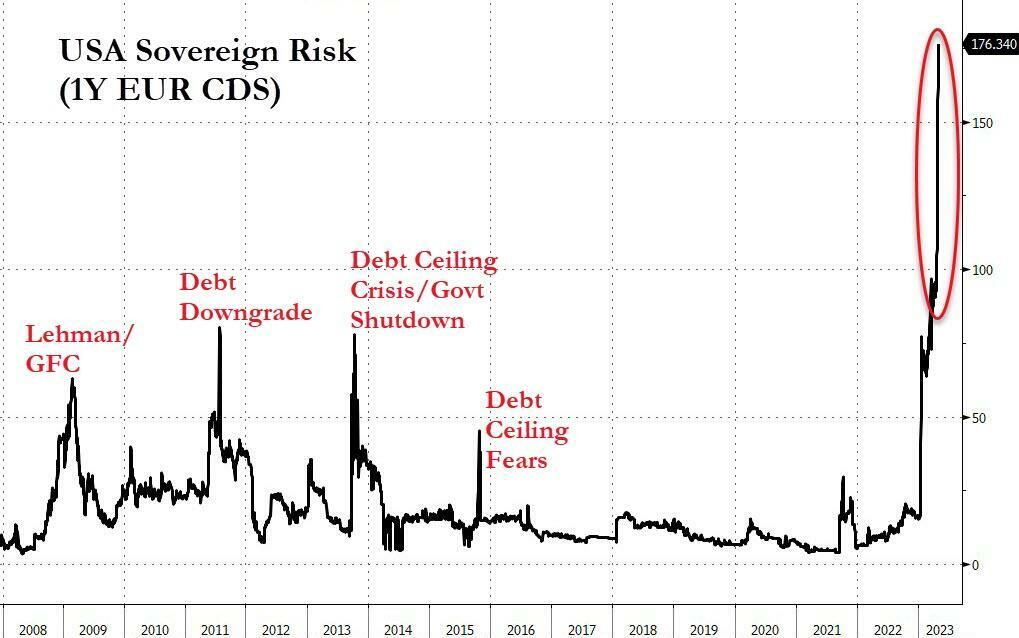by Quoth The Raven, QTR’s Fringe Finance:
 Since March, five major banks have collapsed. Pressure is building up in the economic system while our government crosses the Rubicon with how they handle policy. Something’s going to blow.
Since March, five major banks have collapsed. Pressure is building up in the economic system while our government crosses the Rubicon with how they handle policy. Something’s going to blow.
A long time ago, in a different lifetime, I used to work at an industrial plant that operated several 20-ton chemical processes. Our processes operated using a closed-loop system, in the absence of oxygen, and were not pressurized.
TRUTH LIVES on at https://sgtreport.tv/
We monitored each aspect of our processes using an array of gauges, pressure sensors, thermocouples, and other devices to make sure things were running smoothly at any given point.
Near the midpoint of each process, we had a blowoff valve — a long piece of piping that led to the outside of the building, fitted with a seal that was set to blow out when it reached a certain pounds per square inch (PSI) threshold. The valve was meant to be a safety mechanism so that if, inadvertently, pressure started to build up inside of the process, it would “blow off” outside the building, instead of turning our process into a 20-ton pressure bomb waiting to explode. It’s the same principle that causes a kettle to scream when the steam reaches a certain pressure inside: the whistle only goes off once the water gets hot enough to create enough steam.

Our economy nowadays is similarly a process with lots of variables — though far more toxic than our green process used to be. Regarding our economy, you could throw a dart and pick any variable to monitor: CPI, GDP, the money supply, the price of equities, the price of commodities, or even things like average number of potato chips contained in a $0.99 bag. Just like the economy is trillions of transactions taking place every day, there are similarly an endless number of variables that one could monitor to try and forecast the health of our financial closed loop process.
Two “variables” that happened to catch my eye on Friday were (1) another regional bank collapsing, and being put into receivership and (2) the price of equities continuing to move higher as though nothing is wrong. Each of these effects had their causes: the bank collapsed because, like Silicon Valley Bank, it lost confidence when it announced it would likely need to sell billions in assets, and the price of equities moved higher because of skewed behavioral market psychology that’s a residual effect of 15 years of horrifically arrogant monetary policy and easy money policies.
The juxtaposition of these two variables — the fact that markets didn’t care and/or notice that another bank had just collapsed — is tough to overlook.
It’s especially tough when put into context. Since March, five major banks have collapsed: Silicon Valley, Silvergate, Signature Bank, Credit Suisse and now First Republic.
For 10 years, I’ve been ranting about how the stock market isn’t the economy, and laying out why one can move without affecting the other, but this odd relationship between equity markets and economic reality just seems like an insult to the natural laws of economics and free markets. The CDS market seems to understand this.

But I digress, I’m not here to fight the trend of markets or claim that I’m right when the market is clearly proving me wrong. Rather, what I reminded myself of on Friday, is that there are an infinite number of other economic “blow off valves” that can bear the dire reality of the economic disaster that is unfolding, and that equity prices seem to be eluding.
What I mean is that equity prices could remain high, but something else is going to have to give if that’s going to be the case, as I’ve written about in the past.
Put it this way: if interest rates and equity prices were the only two economic variables in the entire macro system, the market would be down 80% off its highs by now, at least. But they’re not. Instead, we have to contend with things like the money supply and market psychology, not to mention commodities, Fed bond buying (and selling), and numerous other “wild cards”. This never-ending list of things we must contend with also means there is a never-ending list of alternate items where the turmoil that should be showing up in equity markets will be diverted to.
The most likely candidates to “blowoff” are precious metals, in my opinion (and maybe even bitcoin).
Right now, the Federal Reserve is the person at the party who is so drunk, they’re the only one that thinks they’re in control. The rest of the party is just looking on in horror and embarrassment.
It is beyond disturbing that the government right now is bailing out banks left and right, with a ho hum attitude, as if it’s no big deal. That attitude has grown on the Treasury Secretary and Fed like a mold, left over from the damp blanket of hubris-laden monetary policy we draped the economy with over the last 15 years.
Remember in 2008 when we actually had to have a debate about whether or not to bail out the global economic system because of — oh, you know, moral hazard and the general idea that maybe we don’t want to walk a path that could lead to the collapse of our currency?
Well that bailout set a nasty precedent. If we were faced with the same type of decision to make today, it would be signed, sealed, delivered and finished with Powell and Yellen smiling as though they saved the world, in under an hour. There is no moral hazard debate. There is no U.S. dollar debate. There is no debate about abusing our “privilege” of being able to print money. There’s no debate at all. Bailouts and printing are simply an assumption now. Like Caesar, we may now be in for massive consequences for crossing a small rubicon.
Read More @ QuothTheRaven.substack.com





